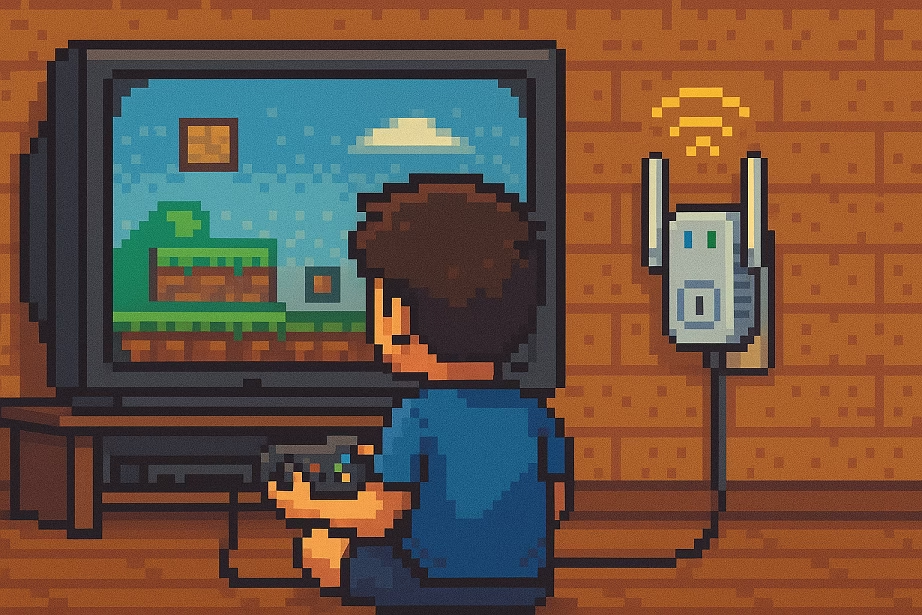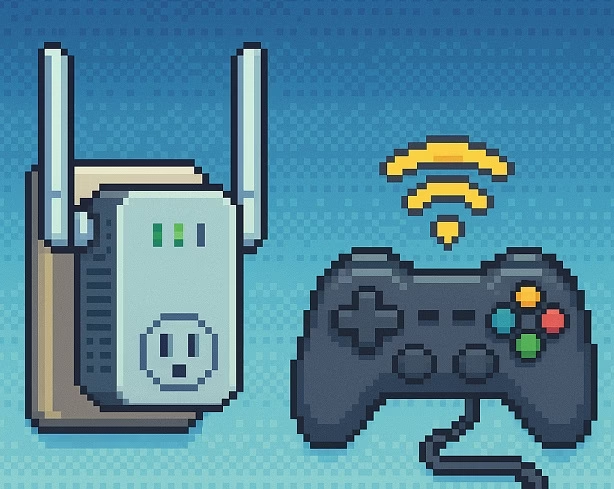Introduction: Why Wi-Fi Extenders Matter for Gamers
In the fast-paced world of online gaming, a few milliseconds can mean the difference between victory and defeat. Nothing frustrates gamers more than lag spikes, packet loss, or unstable connections. While upgrading your internet plan helps, it won’t fix weak Wi-Fi signals in certain parts of your home. This is where Wi-Fi extenders for gaming come into play.
Wi-Fi extenders amplify your existing wireless signal, ensuring consistent speed and stability across every room. Whether you’re playing competitive FPS titles or streaming on Twitch, a reliable extender can drastically reduce latency and improve overall performance.
Understanding Wi-Fi Extenders and Their Role in Gaming
What Is a Wi-Fi Extender?
A Wi-Fi extender, also known as a range extender or repeater, boosts your router’s existing signal and redistributes it to areas where your Wi-Fi connection is weak. It acts as a bridge between your router and gaming device, providing stronger coverage in hard-to-reach zones.
How Wi-Fi Extenders Improve Gaming Performance

For gamers, consistent connectivity is crucial. Wi-Fi extenders help:
- Eliminate dead zones and weak signals
- Reduce ping times and packet loss
- Provide stable connections for multiple devices
- Enhance streaming quality during live gaming sessions
By strengthening your connection, you can enjoy uninterrupted gaming on consoles, PCs, and even cloud platforms like NVIDIA GeForce Now or Xbox Cloud Gaming.
Key Factors to Consider When Choosing a Wi-Fi Extender for Gaming
Speed and Bandwidth Requirements
Gaming demands high-speed connections with minimal interruptions. Choose an extender that supports Wi-Fi 6 or Wi-Fi 6E, capable of speeds over 1 Gbps. These ensure smooth gameplay even when other devices are connected.
Dual-Band vs. Tri-Band Extenders
Dual-band extenders (2.4GHz + 5GHz) are great for most gamers, but tri-band extenders offer a dedicated backhaul channel, preventing congestion and maintaining higher speeds.
Latency and Ping Stability
Latency is the silent killer of online performance. Look for extenders optimized for low-latency gaming, which prioritize packets from gaming devices to reduce lag spikes.
Compatibility with Routers and Consoles
Ensure your extender is compatible with your router and gaming setup. Most modern extenders work seamlessly with Xbox, PlayStation, Nintendo Switch, and gaming PCs.
Top Wi-Fi Extenders for Gaming in 2025
1. TP-Link RE715X – Best Overall Wi-Fi Extender for Gaming
Featuring Wi-Fi 6 technology, dual-band support, and speeds up to 5400 Mbps, the TP-Link RE715X is ideal for gamers seeking stability and range. It’s easy to install, supports OneMesh, and ensures minimal latency for PC and console gamers alike.
2. NETGEAR Nighthawk EAX80 – Fastest Wi-Fi Extender for Gamers
The Nighthawk EAX80 is built for speed demons. With Wi-Fi 6 support and 8 simultaneous streams, it provides ultra-low latency and strong coverage up to 2500 sq. ft. Perfect for competitive players who demand top-tier performance.
3. ASUS RP-AX58 – Best for Console Gaming
ASUS’s RP-AX58 offers robust gaming optimization and seamless integration with ASUS routers. It’s great for PlayStation and Xbox gamers, offering consistent ping and strong 5GHz performance.
4. Linksys RE7000 – Best Budget Gaming Wi-Fi Extender
If you’re gaming on a budget, the Linksys RE7000 delivers impressive value with decent speeds and range. It supports MU-MIMO technology for smoother connections with multiple devices.
5. D-Link DAP-X1870 – Best for Multi-Device Gaming Setups
With Wi-Fi 6 and a sleek design, the D-Link DAP-X1870 excels in shared gaming spaces. It can handle multiple high-speed connections simultaneously without lag.
Comparing Wired and Wireless Extenders: Which Is Better for Gaming?
Ethernet Backhaul Advantage
While Wi-Fi extenders can improve wireless connectivity, nothing beats a wired Ethernet connection when it comes to gaming stability. Many modern Wi-Fi extenders offer Ethernet ports for a wired backhaul, meaning they can be connected directly to your gaming console or PC.
This setup reduces interference, eliminates packet loss, and delivers consistent, near-zero latency performance — ideal for competitive gamers who rely on split-second reactions.
Advantages of using Ethernet backhaul:
- Zero interference from other wireless devices
- Stable and consistent ping
- Better upload speeds for live streaming
- Reliable performance for online multiplayer games
Wi-Fi Mesh Systems vs. Traditional Extenders
Mesh systems like Google Nest Wi-Fi Pro, Eero Pro 6E, or TP-Link Deco XE75 are gaining popularity among gamers. Unlike traditional extenders that connect to your router as a separate network, mesh systems use smart routing to provide seamless connectivity across all nodes.
Pros of Mesh Systems:
- Single network name (SSID) throughout the house
- Intelligent signal routing for optimal performance
- Excellent coverage for large homes
Cons:
- Higher cost compared to extenders
- Slightly complex setup for beginners
If you game in multiple areas or on mobile devices (e.g., handheld consoles like Steam Deck), a mesh system might be worth the investment.
Setup Tips to Maximize Gaming Performance
Optimal Placement of Your Wi-Fi Extender

Placement plays a critical role in performance. Avoid tucking your extender behind walls or furniture. Ideally, position it midway between your router and your gaming device.
Use signal indicators or apps like TP-Link Tether or Netgear Nighthawk to find the best location for maximum coverage.
Pro Tips:
- Keep it at least 3–5 feet off the ground
- Avoid microwave ovens, cordless phones, and thick concrete walls
- Use the same SSID if possible for smoother transitions
Firmware Updates and Channel Optimization
Manufacturers frequently release firmware updates to improve extender stability and performance. Regularly updating your device ensures it runs optimally.
Also, check your router’s channel — overcrowded Wi-Fi channels can cause lag. Tools like WiFi Analyzer help you find less congested channels.
Using QoS Settings for Lag-Free Gaming
Quality of Service (QoS) allows you to prioritize gaming traffic over other types of data. If your extender or router supports QoS, assign gaming devices higher priority to minimize lag, especially when multiple users share the network.
Common Mistakes Gamers Make with Wi-Fi Extenders
Even the best extender won’t help if set up incorrectly. Here are common pitfalls to avoid:
- Using the same frequency band for both router and extender (causes congestion)
- Placing extenders too far from the main router (weak signal input = weak output)
- Ignoring firmware updates (leads to outdated security and performance issues)
- Connecting too many devices to the extender (reduces bandwidth for gaming)
Always ensure your extender gets a strong input signal — the output can never be stronger than the source.
FAQs About Wi-Fi Extenders for Gaming
1. Do Wi-Fi extenders increase gaming speed?
Wi-Fi extenders don’t technically increase your internet speed; instead, they amplify the existing signal from your router. This results in more stable connectivity and better gaming performance in weak-signal areas.
2. Can I use a Wi-Fi extender for my PS5 or Xbox?
Absolutely! Most modern Wi-Fi extenders are console-friendly. Just ensure your extender supports Wi-Fi 6 or Ethernet connectivity for optimal latency.
3. Are mesh systems better than extenders for gaming?
Yes, for larger homes or multiple gamers, mesh systems outperform extenders. They maintain consistent performance without requiring you to switch networks.
4. How far should a Wi-Fi extender be from the router?
Ideally, your extender should be placed midway between your router and your gaming device, in a location where it still receives a strong signal (around 50–70% of full strength).
5. Do extenders cause lag in online games?
If properly set up, modern Wi-Fi 6 extenders do not cause noticeable lag. However, poor placement or interference can lead to signal drops.
6. What’s the difference between an extender and a repeater?
While both devices extend Wi-Fi range, repeaters simply rebroadcast signals, whereas extenders amplify and optimize them for better coverage and stability.
Conclusion: The Best Wi-Fi Extender for Gaming Experience in 2025
When it comes to Wi-Fi extenders for gaming, the best choice depends on your needs and setup. If you’re after top-tier performance, the NETGEAR Nighthawk EAX80 leads the pack with unmatched speed and range. For budget-conscious gamers, the Linksys RE7000 provides reliable performance at a lower cost.
No matter which option you choose, remember:
A good extender can’t fix a poor internet connection, but it can transform your gaming experience by providing the speed and reliability your router alone can’t deliver.
For more detailed comparisons and buying advice, check out PCMag’s 2025 Best Wi-Fi Extenders Guide
